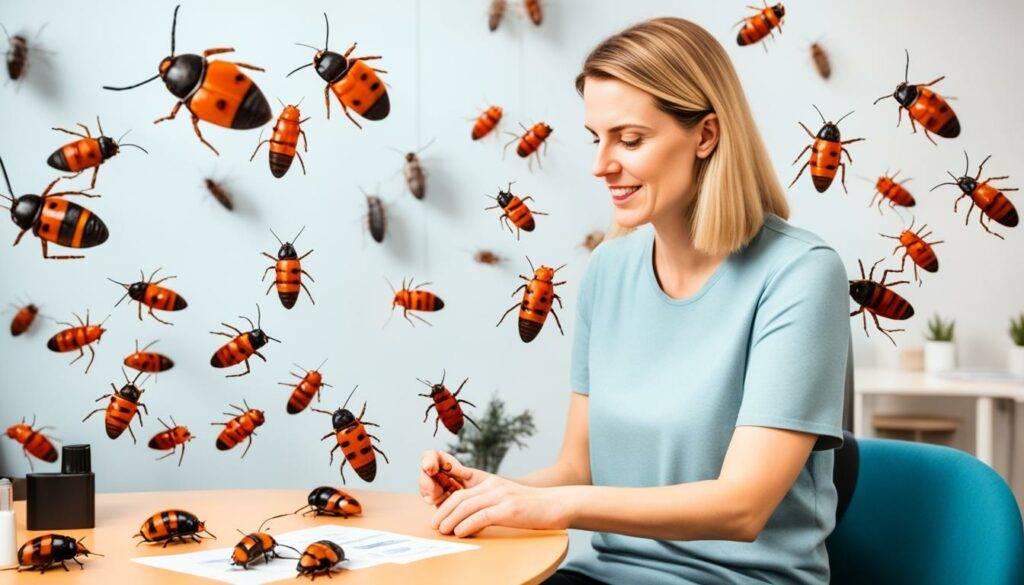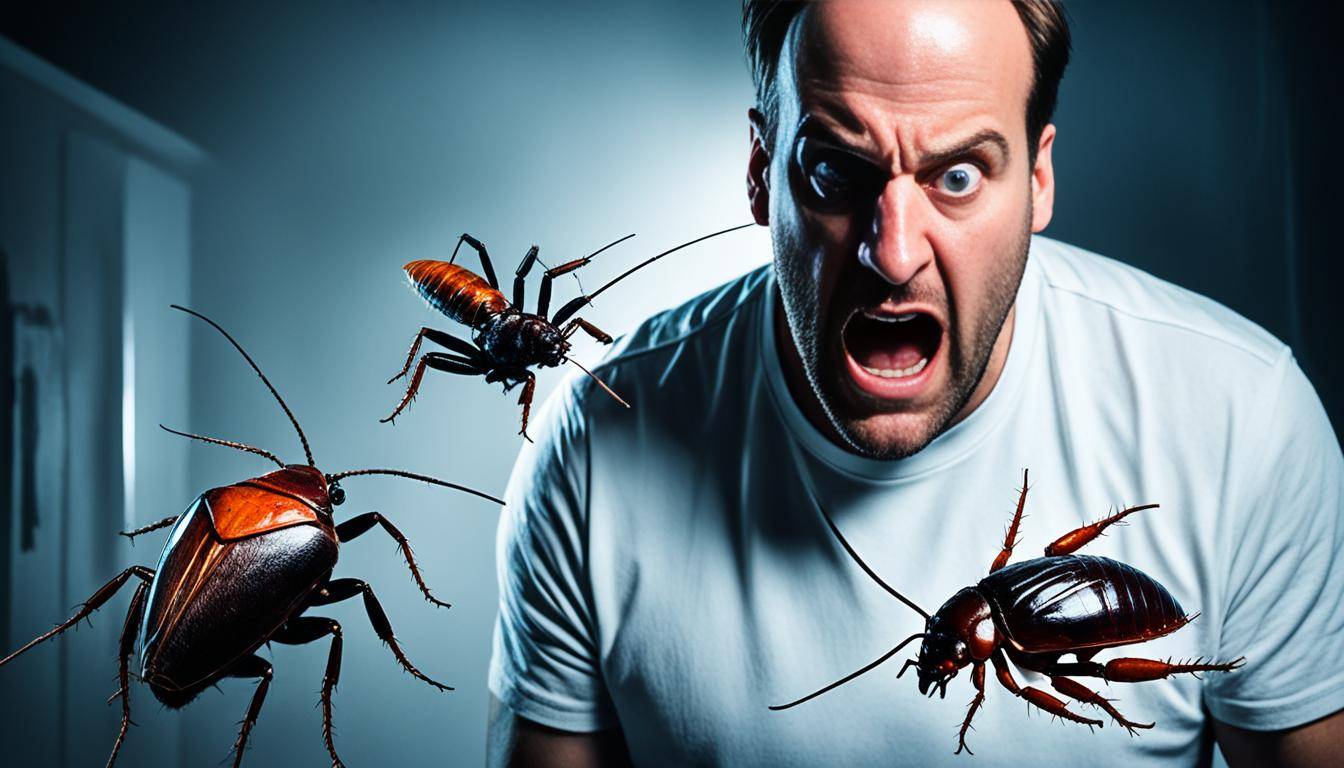Introduction
Did you know that approximately 101% of the world's population has an intense phobia of cockroaches? This phobia, called Katsaridaphobia, can trap us indoors and affect our lives in unexpected ways. This article will show you how to overcome this phobia in just five easy steps. We'll learn tools and techniques to overcome your fear.
Cockroach phobia isn't just a minor annoyance. It can cause anxiety, increased heart rate, and panic attacks. This leads many people to avoid leaving the house or spend a lot on cockroach-killing products.1. Cognitive behavioral therapy is an effective form of treatment2We'll look at self-help techniques, insights into therapy, and ways to face the challenge.
Learn More
What is cockroach phobia?
THE cockroach phobia, also called katasaridaphobia or blatophobia, is a very strong and unreasonable fear. This fear can greatly affect the lives of those who have it. It's not just about not liking insects. It can cause strong physical and emotional reactions.
Definition and symptoms
Who has cockroach phobia You may experience a variety of things, including nausea, dizziness, and difficulty breathing.3. About 3.5% of the world's people have this fear4. Some may even have reactions such as screaming, paralysis and very heavy sweating.3.
These people may avoid places where they might encounter cockroaches. This can alienate them from friends and family.3. Fear and symptoms can greatly affect social life and quality of life.4.
Difference between fear and phobia
Fear and phobia are different things. Fear is a natural reaction to dangerous situations. A phobia is a very strong fear that prevents you from doing normal things.3. The fear of cockroaches may come from the idea that they are dirty and can transmit diseases.3.
On the other hand, a phobia of cockroaches can lead people to have negative fantasies about them. They may think they might be bitten or poisoned.3.
How can cockroach phobia affect your life?
THE cockroach phobia, or Katsaridaphobia, affects more than just the moment of encountering the insects. It can profoundly and completely change the lives of those who suffer from it. People with this phobia react intensely when they see cockroaches, with symptoms such as a racing heart and rapid breathing.5This can lead to a fear of leaving the house or being in places where there may be cockroaches, which affects social relationships and can cause isolation.
Impacts on quality of life
Having a phobia of cockroaches can make it difficult to participate in social events. The person may feel constantly on alert for fear of encountering them. One study showed that 75.61% of people are afraid of insects or arachnids.6This can lead to a very clean home and avoiding places that seem to have bugs, creating a cycle that is difficult to break.
Social and emotional effects
Cockroach phobia also affects social and emotional life. It can harm relationships with others and lead to prejudice. The phobia can be seen as a sign of anxiety or weakness. Approximately 2.41 to 3.31 percent of young people have specific phobias, which can lead to loneliness and depression if left untreated.7.

Causes of cockroach phobia
Cockroach phobia, or Katsaridaphobia, comes from evolutionary factors and experiences of social learningThese factors make us fear these insects. Many humans avoid cockroaches because they associate them with disease, which explains the panic we feel.
Culture and social environment also influence our fears. They help shape these phobias.
Evolutionary and biological factors
Cockroaches resist insecticides because of genetic mutations8These mutations allow them to survive in dirty environments. This reinforces the fear of contamination, linked to dirt and disease.3.
So, cockroach phobia isn't just an irrational fear. It's an evolutionarily developed survival mechanism.
Traumatic experiences and social learning
How we learn to react to fear is crucial to the formation of phobias. Traumatic experiences, especially in childhood, can increase fear of cockroaches. Many cases of childhood phobia improve over time, but some persist.5.
Observing how other people react to cockroaches can influence our fear. This can lead to lifelong avoidance behaviors.3.
| Factor | Description |
|---|---|
| Evolutionary Factors | Development of aversion to creatures associated with disease. |
| Traumatic Experiences | Stressful events in childhood that can intensify fears. |
| Social Learning | Observation of reactions to fear among family and friends. |
Recognizing the Symptoms of Cockroach Phobia
It's crucial to recognize the symptoms of cockroach phobia. This phobia affects our lives in many ways. It can cause rapid heartbeat, sweating, and even tremors.9.
Additionally, severe panic and anxiety can set in. This makes it difficult to live in places where cockroaches may be present.
Physical and emotional reactions
When you see cockroaches, your body reacts intensely. You may feel tingling and your pupils may dilate.9. In addition, many people feel a great fear.
This fear can cause them to avoid certain situations, significantly affecting their quality of life.
When to seek professional help
It's important to know when to seek help. If your cockroach phobia is significantly affecting your daily life, it's time to seek treatment.10Behavioral therapies can help a lot.
With treatment, it's possible to regain control over your fear. This is the first step toward overcoming it.

Self-help techniques for dealing with cockroach phobia
To overcome a cockroach phobia, there are several self-help techniques. They help control anxiety and cope with fear. The practice of relaxation techniques is very effective. It improves mental and physical well-being.
Relaxation and breathing practices
Deep breathing exercises are great for calming the mind. We can add practices like meditation or mindful breathing to our routine. These relaxation techniques reduce stress and improve focus, helping to control anxiety about anxietyMuscle relaxation also helps reduce the stress response.
Gradual exposure to fear
THE gradual exposure to fear is another effective technique. It involves gradual contact with the object of fear, which is the cockroach. We begin by visualizing images of cockroaches and, gradually, interacting with them in controlled environments. This practice helps desensitize the negative emotional response and break the cycle of fear. Having a professional for guidance can improve results.1112.
How Cognitive Behavioral Therapy Can Help
Cognitive behavioral therapy (CBT) is an effective way to treat cockroach phobia. It focuses on changing negative thoughts about cockroaches. This helps us view our fears more rationally.
Principles of cognitive behavioral therapy
In CBT for cockroach phobia, we use techniques such as cognitive restructuringThis helps correct thoughts that increase anxiety. Phobias can affect our lives, harming relationships and daily life.13.
Studies show that CBT is effective against social phobias. This demonstrates its potential for overcoming various phobias.13.
Cognitive restructuring techniques
An important CBT technique is cognitive restructuringIt helps manage the anxiety of the phobia. Through psychoeducation, we explain the disorder and how it works, reducing anxiety.
The progressive exposure technique helps familiarize the patient with the phobia. This is done by gradually increasing exposure to phobia-related stimuli. This process is crucial for reducing the negative impact of the phobia.13.

The importance of professional help for cockroach phobia
Seeking professional help for a cockroach phobia is crucial. This helps you deal with the intense and irrational fear, called katsaridaphobia. About 1 in 10 people have this fear, which can range from a simple dread to a complete aversion to cockroaches.14.
Professionals offer the cockroach phobia treatment necessary. This may include cognitive behavioral therapy and gradual exposure techniques14.
Therapy not only helps overcome fear but also allows you to create personalized strategies. This takes into account common negative associations, such as cockroaches and dirt.15With the right treatment, the symptoms of katsaridaphobia, such as anxiety and panic attacks, can be controlled.14.
Professional support is crucial, especially for children. They can learn to fear things from their family members' observations.15A safe therapeutic environment helps to overcome fear gradually and consciously. This shows the importance of seeking professional help for cockroach phobia in this process14.
| Aspect | Description |
|---|---|
| Name of the phobia | Katsaridaphobia |
| Impact on life | Intense fear that can affect quality of life and social relationships |
| Statistics | 1 in 10 people have some degree of katsaridaphobia |
| Treatments | Cognitive behavioral therapy and graded exposure |
| Alternative treatments | Hypnosis and life coaching |
Overcoming cockroach phobia in 5 steps
Overcoming a phobia of cockroaches is a challenge, but it's possible with dedication. By following five steps, we can overcome and lessen our fear of these insects.
Step 1: Recognize the problem
Admitting we have a phobia is the first step. It's crucial to recognize that anxiety affects our routine and quality of life.
Step 2: Find information about the cockroach
Learning about cockroaches can help demystify them. Knowing about their habits and how they live in our homes can reduce fear.
Step 3: Practice relaxation techniques
Relaxation practices, such as meditation and deep breathing, are essential. They help manage anxiety and combat cockroaches.
Step 4: Gradual exposure
Gradually exposing yourself to the phobic object is an important strategy. Starting with videos or photos and progressing to interactive situations is a good approach.
Step 5: Assess progress and seek support
Assessing our progress is crucial. Seeking support from mental health professionals is a good strategy. Psychological treatment can be effective within two months.16.

These five steps aim to reduce your level of alertness and control negative feelings. Psychological treatment is an effective solution for those who are afraid of cockroaches.16.
Myths and truths about cockroach phobia
Myths about cockroaches create a false image of these insects. Many people think that all cockroaches are dangerous. But in fact, there are more than 4,000 species of cockroaches, including more than 640 in Brazil.1718. Not all of them are dangerous. Some are good for the environment, helping to recycle nutrients.
Demystifying cockroaches
Understanding cockroaches better helps dispel myths. They can carry diseases like tuberculosis and diarrhea, which frightens many people.17However, taking good care of your home and managing waste can prevent infestations. They multiply quickly, but a clean environment can control them.17. See more information here.
How knowledge helps in overcoming
Knowing cockroaches well helps overcome fear. By understanding them better, we see these insects more logically. Knowing that they resist insecticides and are more active at night can change your perspective.17With the right knowledge, we can learn to deal with fear and live better.
Alternative treatments for cockroach phobia
There are alternative treatments for those with a cockroach phobia, such as hypnosis and other therapies. Hypnosis can be a good option because it helps change how you feel and perceive your fear. It uses regression techniques to identify the underlying cause of your fear and change the meaning of those events.19.
Hypnosis and its applications
Hypnosis can be very helpful for those with a cockroach phobia. Instead of forcing the person to confront the insect, it helps them feel confident in dealing with the situation. This allows the person to change how they react to fear and learn to control their emotions.19This approach can bring lasting changes in behavior and perception.20.
Other complementary therapies
In addition to hypnosis, other therapies can help overcome a cockroach phobia. Practices such as meditation, mindfulness, and holistic approaches are good options. They help reduce anxiety and increase awareness of one's body and emotions. These techniques are important in treating phobias and fears, offering emotional support during recovery.

| Type of Treatment | Description | Effectiveness |
|---|---|---|
| Hypnosis | It helps to modify the perception of fear and the emotional response. | High, especially when guided by experienced professionals. |
| Meditation | Increases awareness and reduces anxiety through relaxation practices. | Average, effective as a complement to other therapies. |
| Mindfulness | Promotes acceptance of fear and teaches coping strategies. | High, helps create distance from fear. |
| Holistic Approaches | Integration of different practices to treat the mind and body. | Average, varies based on individual needs. |
The future of cockroach phobia treatment
The treatment of cockroach phobia is evolving. Research and therapies are seeking new approaches to improve results. Approximately 201,000 people worldwide have this phobia.21People are looking for quick and effective treatments, as many do not find success with traditional methods.
Trends in research and therapy
Therapies are becoming more diverse, such as hypnotherapy. A recent case showed that a client achieved success in just one hypnotherapy session, after years of unsuccessful treatments.21This may point to a future with faster and more effective treatments for cockroach phobia.
Use of technology and innovative therapies
Technology is transforming the treatment of phobias. Virtual reality apps and therapies are changing how we deal with fears. Technology makes access to innovative therapies easier, increasing adherence and results. This can help overcome resistance to traditional treatments.

| Technique | Duration of Treatment | Effectiveness |
|---|---|---|
| Conventional treatments | Years of therapy | Limited results |
| Hypnotherapy | A session | Fast and positive results |
| Technology-Based Therapies | Variable | Accessibility and engagement |
THE future of cockroach phobia treatment looks promising. Combining traditional and technological methods can help people overcome their fears more effectively.
Conclusion
Overcoming a phobia of cockroaches can greatly improve your life. Knowing that entomophobia is a profound and unfounded fear is the first step. This helps us better understand and treat it.22.
To overcome this, it's important to identify the symptoms and their cause. This could be something that happened in the past. So, we use relaxation techniques and therapy to improve23.
Treating a cockroach phobia requires a plan and professional help. They teach you how to gradually manage your fear. Furthermore, deep breathing and meditation help you control your emotions.2223.
To overcome a phobia, it's important to seek help and follow a plan. With effort and the right techniques, it's possible to overcome the challenge and return to living well.
Find a Therapist, Schedule 20 minutes for free now.
FAQs
Listen to this podcast about the fear of cockroaches, have fun learning:
Cockroach phobia, or Katsaridaphobia, is a very strong and unreasonable fear of cockroaches. It can significantly affect people's daily lives.
What are the symptoms of cockroach phobia?
Symptoms include anxiety, racing heart, dizziness, excessive sweating, and panic attacks. These symptoms occur when a person is near or thinks about cockroaches.
What is the difference between fear and phobia of cockroaches?
Fear is a normal response to a threat. A phobia, on the other hand, is a very intense and out-of-control reaction. It can significantly affect a person's life.
How can cockroach phobia affect my quality of life?
This phobia can make you avoid places and activities. This can cause stress and lead to isolation.
What are the causes of cockroach phobia?
Causes include evolutionary factors, traumatic childhood experiences and what we learn from others.
When should I seek professional help to treat cockroach phobia?
Seek help when fear begins to affect your daily life and quality of life.
Does the person lose memory of what occurred during hypnosis?
Myth. In most cases, the person remembers what happened, although in certain cases there may be temporary amnesia.
What self-help techniques are effective in dealing with cockroach phobia?
Techniques like deep breathing and meditation help. gradual exposure to fear is also useful.
How can cognitive behavioral therapy help with cockroach phobia?
Therapy helps change negative thoughts about cockroaches. This allows you to face your fear more effectively.
What are the benefits of seeking professional help for cockroach phobia?
Professionals offer personalized treatments, such as cognitive behavioral therapy, which increases the chances of overcoming the phobia.
What are the steps to overcome cockroach phobia?
Steps include recognizing the problem, learning about cockroaches, using relaxation techniques and gradually expose yourself. It's important to have the support of professionals.
Are there any myths about cockroach phobia that we should debunk?
Yes, there are many myths about cockroaches. Debunking them can help those with phobias better understand these insects.
What alternative treatments are available for cockroach phobia?
Treatments such as hypnosis and complementary therapies such as mindfulness and meditation are effective.
What are the innovations in the treatment of cockroach phobia?
Research is exploring innovative therapies, such as technology, apps, and virtual reality, to help manage the phobia more effectively.
